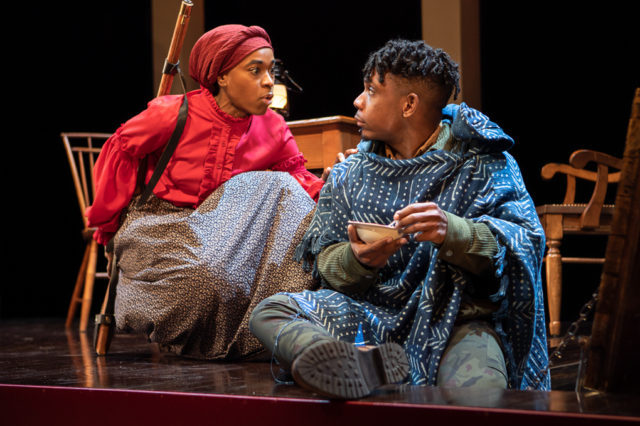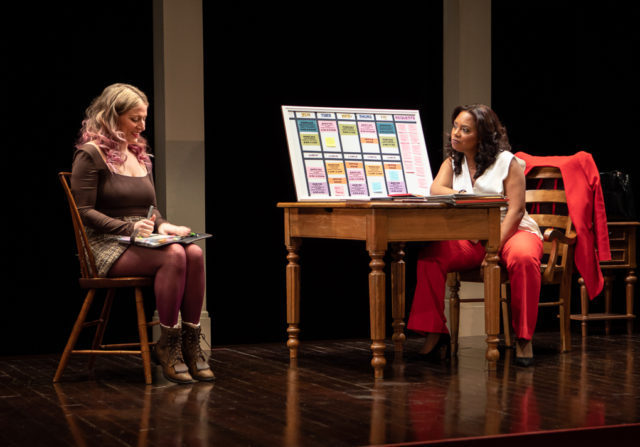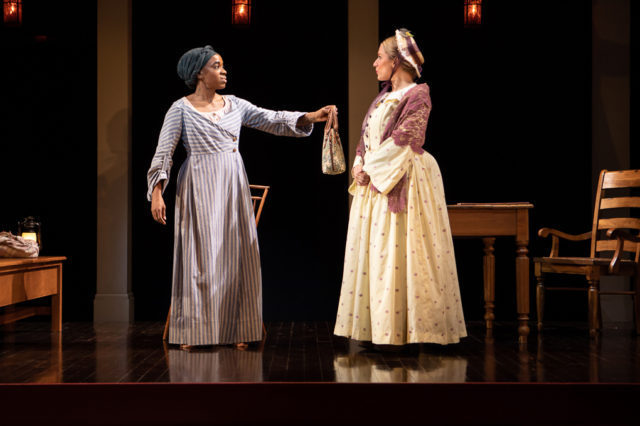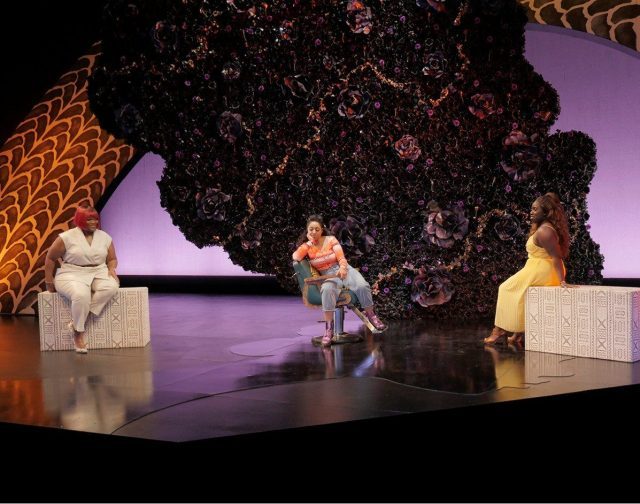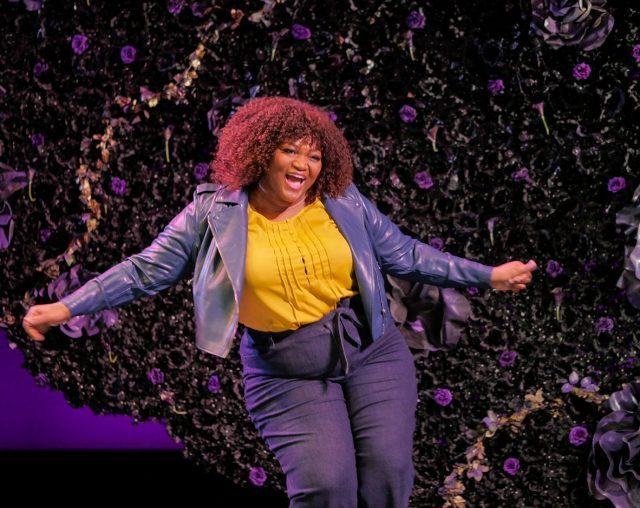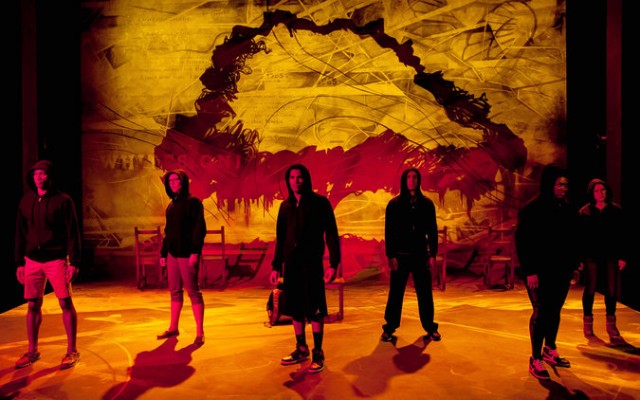
Tory Kittles is flanked by Brittany Inge and Stori Ayers, who play forty characters in Samm-Art Williams’s Home (photo by Joan Marcus)
HOME
Todd Haimes Theatre
227 West Forty-Second St. between Broadway & Eighth Ave.
Tuesday – Sunday through July 21, $49-$149
212-539-8500
www.roundabouttheatre.org
Tony-winning director Kenny Leon describes his Broadway revival of Samm-Art Williams’s rhythmic, poetic Home as a two-hundred-yard dash. It’s more like an Olympic relay, and his team wins the gold.
In December 1979, the Negro Ensemble Company debuted Home at St. Marks Playhouse, with Charlie Brown, Michele Shay, and L. Scott Caldwell, directed by Douglas Turner Ward; the show transferred to the Cort Theatre on Broadway in May, earning Tony nominations for Best Actor and Best Play. A 1982 DC version featured Samuel L. Jackson, S. Epatha Merkerson, and Elain Graham. Sadly, Williams, who was also an actor and television writer and producer, working on such series as The Fresh Prince of Bel-Air, Martin, and Frank’s Place, passed away in his hometown of Burgaw, North Carolina, on May 13 at the age of seventy-eight, just a few days before the first preview of Leon’s throughly engaging Roundabout production at the Todd Haimes Theatre.
Home takes place on Arnulfo Maldonado’s low-tech, cozy set, centered by a rocking chair on a wooden platform in front of a tall row of vegetables and a backdrop of vast green fields under a cloudy sky in the town of Cross Roads, North Carolina, a storm sometimes visible in the distance. Occasionally, a black cutout of a silhouetted house narrows the stage. The show begins with Cephus Miles (Tory Kittles) taking a deep breath — as if getting ready for the race — and two unnamed women who serve as a Greek chorus (Brittany Inge and Stori Ayers) singing, “In the great gitt’n up morning fare you well. Fare you well.” The second woman adds, “If there was ever a woman or man, who has everlasting grace in the eyes of God. It’s the farmer woman . . . and man.”

Cephus Miles (Tory Kittles) searches for home in fast-paced Roundabout revival (photo by Joan Marcus)
However, everlasting grace does not necessarily mean success and happiness. A moment later, after the first woman agrees that Cephus is blessed, the second woman says, “Shit. Big deal. He can think about grace while he’s chopping wood this winter to go in that ‘pop belly’ stove that he cooks on. Or when he has to pack mud in the cracks of his house to keep the wind out, or when he has to use newspaper to wipe his ‘behind’ because toilet paper is just not in his budget.”
Cephus is a simple man with simple desires. He cultivates the fields with his uncle Lewis and granddaddy and appears destined to marry the young and innocent Pattie Mae Wells (Inge). Though not a religious man, he agrees to be baptized by Rev. Doris (Ayers), who warns Pattie Mae, “Keep your eyes on this one, honey. He ain’t a whole Christian yet.”
The chorus lets us know early on that Cephus, like many local men before him, headed off to the big city but didn’t find what he was looking for. “Maybe they’ll all leave,” the first woman says. The second woman responds, “Most of them have. He left. But he came back. Fool.” Cephus also runs afoul of the draft board when his number comes up to go to Vietnam, as he was taught to love thy neighbor and thou shalt not kill. And to make matters more complicated, Pattie Mae decides to go to college, promising to write him every day.
Cephus undertakes a personal Great Migration in an attempt to find a new home, but amid all that befalls him, he sticks to his roots, explaining, “I have no regrets. No bitterness. I’m thankful. And I pray from time to time.”

Stori Ayers, Tory Kittles, and Brittany Inge make the Todd Haimes Theatre feel like home (photo by Joan Marcus)
Serving as the offstage anchor for this wise and very funny and intimate play that never stops once Cephus draws that first deep breath, Leon further establishes himself as contemporary theater’s most consistently successful Broadway revivalist; in the last ten years, he has directed memorable productions of A Raisin in the Sun, A Soldier’s Play, Topdog/Underdog, Ohio State Murders, and Purlie Victorious (among several off-Broadway shows and Shakespeare in the Park). Next up for Leon is Thornton Wilder’s Our Town in the fall, with Jim Parsons, Zoey Deutch, Katie Holmes, Billy Eugene Jones, Ephraim Sykes, Richard Thomas, Michelle Wilson, and Julie Halston.
Williams (The Montford Point Marine, The Dance on Widows’ Row) wrote Home while taking a bus back to where he was born and raised, Burgaw, North Carolina, influenced by the many characters he met on his journey. The play introduces us to such fanciful figures as Joe-Boy Smith, One Arm Ike, Old Chief, Hard Headed Herbert, Lottie Bell McKoy, Aunt Hannah, Pearlene Costin, Sydney Joe Murphy, Mr. Hezekiah Simmons, Miss Lizzie, and Dingles the invisible dog, each worthy of their own individual story as they tend to the fields, go to church, throw craps in the graveyard, or enjoy the fish fry.
Inge (Father Comes Home from the Wars, The Ballad of Klook and Vinette), and Ayers (Blood at the Root, Travisville) are phenomenal, taking on some forty roles between them, metaphorically passing the baton as they swiftly move from one part to the next with only small changes to their voice and demeanor and to Dede Ayite’s naturalistic southern costumes. Allen Lee Hughes’s tender lighting sharpens the focus on the character-driven narrative, while Justin Ellington’s sound maintains the sense of place even as the basic set stays the same as Cephus experiences life outside of Cross Roads, traveling miles away from his family farm (hence his last name).
Kittles (8 Hotels, Richard II) gives a career-defining performance as Cephus, a kind of southern Odysseus wondering what awaits him when he returns to a land he left years before. Kittles fully embodies the unpredictable Cephus, whether sitting in a rocking chair contemplating his fate, relaxing on the wooden platform sharing sweet memories, standing firm for his principles, or, perhaps, becoming a ghost, his right hand shaking.
The ninety-minute play concludes with a glorious finale that crosses the finish line with pure genius, reminding us all that there’s no place like home.
[Mark Rifkin is a Brooklyn-born, Manhattan-based writer and editor; you can follow him on Substack here.]
